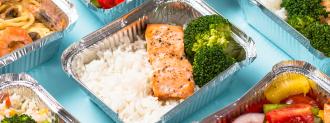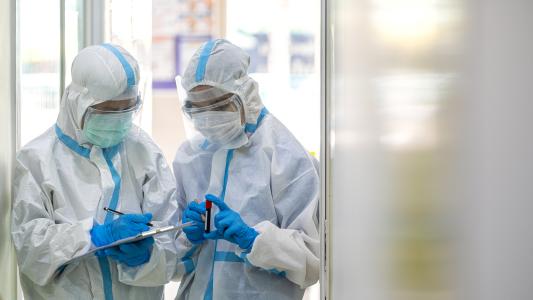The COVID-19 outbreak is forcing restaurants to shut their doors to patrons, but many are still allowed to sell food so long as their customers eat it at home.
But is it safe to order takeout during the coronavirus pandemic?
As one of the few pre-lockdown luxuries that isn’t wholly prohibited, the appeal of restaurant prepared cuisine feels greater than ever right now.
We might not be able to go to the movies or visit with our friends or do much of anything, but we can at least enjoy the normalcy of paying someone to feed us — during this tumultuous time, even a cheap pizza can bring some emotional comfort.
And according to the experts, you don’t need to worry about catching the virus from that slice of pizza, either — as long as you take a few extra precautions.
The 411 on Spreading COVID-19
Knowing why it’s safe to order takeout during the coronavirus pandemic starts with understanding how the virus spreads.
When an infected person coughs or sneezes, the coronavirus travels through the air via droplets. Those droplets can enter a new host via their eyes, mouth, or nose and then infect them through the respiratory tract.
There has never been any information to implicate food-borne transmission of coronaviruses.
William Schaffner
There is evidence that the virus can survive on surfaces. This raises concerns that if an infected person coughed on your takeout, the virus could travel via the food into your body to infect you.
But unless you literally inhale your dinner, you aren’t likely to catch the coronavirus in this way, according to William Schaffner, a professor of medicine in the department of infectious diseases at Vanderbilt University.
“The virus seems to be latching onto cells in the upper reaches of the nose, a place food doesn’t enter,” he told NPR. “Virus that found its way into your gastrointestinal tract would be killed by the acid in your stomach.”
Past research also supports the idea that it’s safe to order takeout during the coronavirus pandemic.
“While COVID-19 is new to us, coronaviruses are not, and with all the studies done on these viruses, there has never been any information to implicate food-borne transmission,” Schaffner said.
How to Order Takeout During the Coronavirus
Schaffner isn’t the only expert saying you can feel free to continue eating food from your favorite restaurant right now, either.
The U.S. Food and Drug Administration and the Centers for Disease Control and Prevention both maintain that people don’t have to worry about catching the coronavirus from food.
However, that’s not to say you shouldn’t take some extra precautions if you order takeout during the coronavirus pandemic.
First, you should do everything you can to minimize person-to-person contact during the process — that means opting for delivery over pickup if at all possible.
If delivery isn’t an option, see if the restaurant offers curbside pickup. Be sure to ask in advance if the server can place the food in your trunk so you never have to have direct contact.
If you’re using a food delivery service that offers contactless delivery, opt in. The delivery person will leave the food outside your front door, and you can grab it once they’re a safe six feet away.
Once you have the food in your home, remove it from the packaging. Throw away or recycle the bags or boxes, and then clean any surfaces the packaging touched.
Finally, you just need to thoroughly wash your hands before eating — and, really, that’s something you should do whether the world is in the midst of a pandemic or not.






